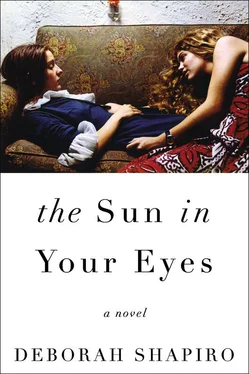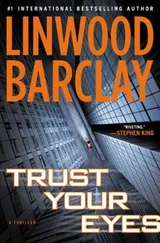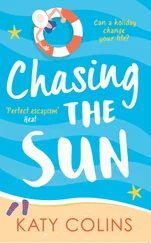Viv had laid her winter coat across her lap, twisting her hands into it.
“You know there’s a closet where we can put that.”
“Oh, right. Of course.”
“Sorry. That sounded really condescending.”
“No, it’s okay.”
Viv handed over the large wool blazer, in black watch plaid, a dingy menswear label sewn by the collar. Lee had made her try it on at the thrift store. When they’d gone shopping, Lee had taken an armful of prospects off the rack while Viv had seemed at a loss, holding on to a seventies ski parka that looked a lot like the one she came in with. Lee insisted on the blazer. It didn’t completely hide, as most of Viv’s clothes did, her hourglass figure, and the deep blue and green flattered her complexion, bringing out the auburn notes in her hair. She looked instantly more grown up. Lee wasn’t going to encourage her to start smoking, but this she could get behind. A way for Viv to present as a little less plain, even as Lee understood that plainness was Viv’s cover, in a sense. Part of a deflecting modesty that downplayed her quiet but firm sense of self. What Lee wouldn’t have minded having a little more of.
“I don’t know how warm it’ll be,” said Viv.
“Wear a sweater under it. You’ll be fine.”
“Won’t it clash with things? It’s not very practical.”
“It’s great on you!”
“You think?”
“Get the fucking coat.”
Viv had found a way to wear it just about every day since.
Lee passed it to the flight attendant with a theatrically underplayed smile and nod that she immediately regretted as something her mother would do. When she told Viv about Linda, Lee was never sure if she was trying to impress her or warn her, or both.
Former model, famous widow, Linda used to arrive at airports to a handful of photographers waiting for a glimpse of her at the gate: dark hair, bangs to her eyelashes, gauzy white tops or tight black knits, braless on occasion. Men and women alike were drawn to her. Women wanted to look like her, and so began the Linda West label: slinky dresses and high-waisted trousers in the seventies, bodysuits and blazers in the boxy eighties, and now the baggy, deconstructed pieces of the nineties. More than one magazine profile had used the word “timeless” to describe Linda’s allure. An extremely expensive French handbag had been named for her, inspired by her je ne sais quoi . She had once been in a commercial that showed her prepping for a photo shoot, carrying her namesake satchel to a lunch meeting, assessing fabric samples in her office, and then coming back to an empty foyer a little lonely and forlorn, until she heard a girl’s voice calling out “Mom!” Lee couldn’t remember what the ad was for. It wasn’t her voice and it wasn’t their house.
Out Viv’s window: a gray sky, slush on the tarmac. Lee watched luggage get tossed into the cargo hold as other passengers pressed their way into the plane. One of them stopped short to take the seat across the aisle. A youngish man who did a subtle double take as if he knew her from somewhere. He carried a just-beat-up-enough leather bag. His hair looked as if he hadn’t washed it in a day or two, likely courtesy of some expensive product, to make you wonder what might be keeping him from shampoo. He glanced at his seat and then back at Lee. For a second, she thought he might ask if Viv wouldn’t mind trading places and she wished Viv were a stranger who would get up and move. And then she felt terrible for thinking that. But he just said, “How’s it going?” and sat down.
“Good,” she said. “How’re you?”
“Not bad. Can’t say I’m the biggest fan of flying, though.”
“No?”
“I’ll be all right.”
“You sure?”
He smiled as if he found her naïveté refreshing. Viv didn’t kick her foot or anything, but Lee could sense her observing the interaction intently. Journal material.
“What?” Lee said, turning back to her.
“Nothing,”
Seeing the slight hurt on her friend’s face, Lee leaned her head on Viv’s shoulder in a show of apology and affection. Something of a show for the man across the aisle, too.
Sometimes it felt to Lee that Viv had been standing in a crowded room, looking around and waiting, and Lee had come up and taken her hand and off they went. It looked as if one was leading the other, but when you take someone by the hand, you’re also holding on.
“Let’s get drinks,” said Lee.
“Is that a thing we should do?” Viv was taken with the novelty of it.
“It’s definitely a thing we should do.”
“White Russians?”
A joke, but not. Who orders a White Russian? Viv did when Lee took her to a dank place in downtown Providence, not too far from College Hill but far enough. Students, mostly, and the occasional thirty-something nodding solemnly in the back. The bartender, a woman just a few years older, had looked askance at Lee— Who is this girl in your charge and wouldn’t she rather be at an ice cream parlor? So Lee asked for one too, though Kahlúa made her ill. The club’s owner, a local fixture, meaty, pushing sixty, Hawaiian shirt over a black tee, told them he liked their style. “Nobody ever comes to this shithole for cocktails!” They came for a sweaty assault of noise. “Not my kind of music,” he said. “But you kids need a place to play.”
The man across the aisle had now taken out a book, but he wasn’t really reading. Lee didn’t recognize the title or the author, but Viv did. Viv started talking, leaning across, saying how devastating the book was, but, like, in the best way.
“Yeah, it is pretty bleak,” he said. “But funny. At least, that’s what it says here on the back.” Eyeing Viv, but not saying it for Viv. So Lee laughed a little and he gave her another smile, not How young you are, but one that said, We’re in the same place at the same time.
“Well, I read it for a class last semester actually,” said Viv, “so I don’t know, maybe it’s one of those, like, texts that you can get into analytically and endlessly interpret so you wind up thinking it’s more than it is? You know what I mean?”
“I’m not sure I do,” he said. “But I think my ex thought the same thing about me.”
Speaking to Viv again while waiting for Lee to laugh. And she did. She burst out with it, an uncorking, and Viv caught it. The pair of them, not even sure what they were laughing about, to the point of losing their breath, finally containing themselves when the captain came on, ordering seatbelts fastened. Had it become obnoxious? Lee turned to the man. “I’m sorry. I don’t know what that was.”
“No, you have a great laugh. You laugh with your whole body.”
Lee had heard versions of that line before, but they had never had such an effect on her, had never left her like this, blushing, feeling exposed. Alive. It wasn’t really because of him, she knew. It had more to do with Viv sitting there next to her, hearing it. Some sort of alchemy happened when they were together. Everything was transformed.
I used to be so diligent. Growing up, I kept a record of everything. Notebooks full of impressions, wishes, words. For what? There’s an inscription in the façade of the Central Library at Grand Army Plaza in Brooklyn — that inside that fortress of a building is “enshrined the longing of great hearts.” I looked up at that when I was twenty-two and thought, What a perfect way to describe what a book is . I wanted the longings of my own heart to be recognized and enshrined somewhere. Somewhere other than a shelf in my closet. Along the way, though, it became hard to think about — let alone talk about — that aspiration without resorting to self-deprecation, a mode that really works only for the self-assured. Without that assurance, you just deprecate and deprecate until there’s not much left. I stopped trying to understand things by setting them down. I started doing things, whether I understood or not. But even then, I was aware that was something of an act, an imitation of how I thought Lee lived life. Closer to the core, somehow, and therefore better. I always secretly suspected her heart was greater than mine.
Читать дальше












